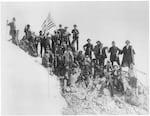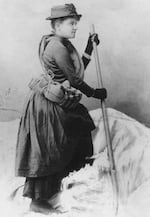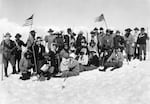On July 19, 1894, the mountaineering club called the Mazamas held its inaugural meeting on the summit of Mount Hood, beginning almost 130 years of mountain climbing, conservation and education.

This image from July 19, 1894, shows the Mazamas on the summit of Mount Hood.
Courtesy of the Mazamas
Visitors to the Oregon Historical Society can explore this history in the exhibit “The Mazamas: For the Love of Mountains,” running now through March 24.
Executive Director Rebekah Philips said in the group’s fall newsletter, “From the beginning, the Mazamas has been collaborative, volunteer-driven, and forward-thinking.”
Early mountaineers scaled the Cascades
In March 1894, a group of mountaineers came together in Portland to draft a constitution for a new organization dedicated to climbing, exploration and scientific achievement. They decided on the name “Mazamas” after a word they thought meant mountain goat in the Nahuatl language, though a 2023 Mazamas newsletter notes that translation is incorrect.
Climbing a glaciated peak would be a requirement for membership, so they decided to launch their first meeting at the highest point in Oregon — the summit of Mount Hood. To generate support and excitement, they advertised in newspapers across Washington, Oregon and California. It worked. Over 350 people from across the Northwest assembled near Government Camp at the base of the mountain.
In the early morning hours of Tuesday, July 19, 1894, the group set out. It proved to be a difficult climb with blizzard-like weather and many turned back.
Fay Fuller, Mazamas co-founder and first woman to climb Mount Rainier
Ultimately, 155 men and 38 women reached the summit and officially formed the new organization.
From the start, the Mazamas welcomed women as full members, including the group’s vice-president Fay Fuller. In 1890, she became the first known woman to successfully scale Washington’s Mount Rainier. As a newspaper reporter, she helped popularize the growing sport of mountain climbing, especially for women.

This image from circa 1890 shows Fay Fuller, the first known woman to climb Mount Rainier.
Courtesy the National Park Service
Fuller described the weather on the Mount Hood climb: “The piercing cold wind blew so strong as to make it necessary to hug the rocks closely, to escape being blown away.”
The Oregonian extensively covered the inaugural climb, including a full front page spread in the Sunday edition which reported, “The object of this assault upon Oregon’s mountain patriarch, besides individual pleasure and satisfaction of achievement, was to hold a banquet on the summit and to organize there an association of mountain climbers.”
From the summit, the group used heliographic mirrors to create a series of flashes seen in Portland, signaling their success. They also voted in their first president, William Gladstone Steel, the leading force behind the organization.
William Gladstone Steel, father of Crater Lake National Park
Steel’s pioneering work led to the creation of Crater Lake National Park in 1902, and the naming of Mount Mazama for the volcano that contains Crater Lake.
Mazama members set four goals for their organization:
- The exploration of snow-capped peaks and other mountains;
- To collect scientific knowledge about the mountain environment;
- To preserve the natural beauty of the forests and mountains;
- And to share all that knowledge around the Pacific Northwest.
A long legacy of preservation, education and climbing
Today, the Mazamas is the third-oldest mountaineering society in the United States. It offers a variety of climbing education programs designed for different experience levels, including 700 hikes and 300 climbs a year.
The OHS website describes the exhibit as “a glimpse into the Mazamas storied past, showcasing its evolution from a group of intrepid mountaineers to a multifaceted organization providing education and resources to outdoor enthusiasts.”

This image from August 11, 1909, shows Mazamas at the Mount Baker summit.
Courtesy of the Oregon Historical Society bb000258
IF YOU GO
Where: Oregon Historical Society, 1200 SW Park Ave, Portland, OR 97205
Cost: Included in museum admission. Admission is free for Multnomah County residents and OHS members.
When: November 8, 2023 - March 24, 2024
Monday - Saturday: 10 a.m. - 5 p.m.
Sunday: Noon - 5 p.m.
RELATED CONTENT
Mount Hood: Climbing Oregon’s Highest Peak
A quick dive into Oregon’s only national park
Loco por la Aventura guides Spanish speakers through Oregon’s outdoors
